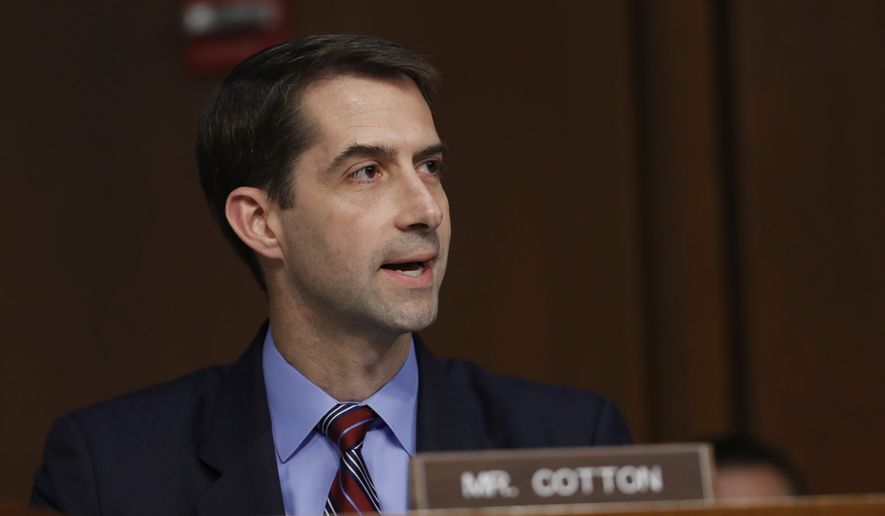Russia’s repeated violations of its 30-year-old agreement to eliminate intermediate-range missiles demands U.S. action, Sen. Tom Cotton said Monday.
The U.S. should pressure Russia into compliance, he said, but prepare to take a harder line — in particular, by modernizing the army.
“We remain in strategic competition with Russia,” Mr. Cotton told a full audience at the Center for Strategic and International Studies. “It’s essential that we modernize our military, especially our army.”
Mr. Cotton, Arkansas Republican, addressed Russia’s mounting record of breaches of the Intermediate-Range Nuclear Forces Treaty, or INF Treaty, a 1987 agreement between Russia and the U.S. in which both countries pledged to eliminate all conventional and nuclear missiles with ranges of 500 to 5,500 kilometers.
Each year since 2014, Mr. Cotton said, the State Department has accused Russia of violating the treaty. In March, the department confirmed press reports that Russia deployed a cruise missile, though Russia denied allegations of noncompliance.
Russia’s treaty violations are “nothing new,” he said, pointing to its alleged breach of the Anti-Ballistic Missile treaty as an example.
“To the Russians, any treaty is just another point of leverage,” the senator said.
The INF Treaty grants Russia security from U.S.’s missiles in Europe, but not from missiles built by European countries — a factor that incentivizes Russia to violate the treaty.
Five months ago, Mr. Cotton, Sens. Marco Rubio and Ron Johnson introduced a plan of action: the Intermediate-Range Forces Treaty Preservation Act, designed to bring Russia back into compliance with the INF Treaty while bolstering the U.S.’s defense capabilities.
The proposal calls for the development of new intermediate-range cruise missiles, $500 million for defense capabilities, the transfer of cruise missile technology to U.S. allies, and prohibition of funding for two treaties Russia wants to keep until Russia complies with INF.
Asked if this proposal would violate the spirit of the INF Treaty, Mr. Cotton responded bluntly: “Vladimir Putin is violating the letter, so if the U.S. violates the spirit, I’m not terribly concerned.”
Mr. Cotton’s proposal faces roadblocks, namely, a period of defense budget cuts and a drastic fall in Army modernization. Calling Russia “the greatest pacing threat for the army,” CSIS released its report on army modernization Monday.
According to the report, army modernization fell by 74 percent from 2008 to 2015. Fifty-two percent of that fall is in the research and development sector, worsening the problem, said CSIS senior fellow Andrew Hunter.
A lack of consensus or clarity on what the army should prioritize compounds the difficulty of modernizing the army, Mr. Hunter added.
“The biggest challenge is communication on what needs to be done, and when,” said retired Army Col. Dan Roper, noting that it’s often hard to explain the army’s needs to Congress members.
Tight budgets — capped further by the 2011 Budget Control Act — limit modernization, too, Mr. Hunter said.
“Every discussion comes down to, ’How much money do I have?’” said Heidi Shyu, former assistant secretary of the Army for acquisition, logistics, and technology. “The Army’s portfolio is far broader than the navy’s and the Air Force’s.”
Ms. Shyu, Mr. Roper and House Armed Services Committee staff member Douglas Bush — panelists at the event — recommended leveraging U.S. allies’ defense capabilities to cover weaknesses left by low funding.
In addition, the CSIS report suggested that the army focus on bolstering five capabilities: electronic warfare, air and missile defense, cross-domain fires, advanced protection, and logistics.
Such capabilities would be even more essential if Russia doesn’t come back into compliance with the INF Treaty — in which case, the U.S. would need to withdraw from the treaty, Mr. Cotton said.
“The one situation we can’t tolerate is Russia violating the treaty and the U.S. being the only nation in the world in compliance,” he said.
Acknowledging the tension between readiness and modernization, both competing for resources, Mr. Cotton reaffirmed the importance of the latter.
“Modernization is tomorrow’s readiness,” he said.




Please read our comment policy before commenting.